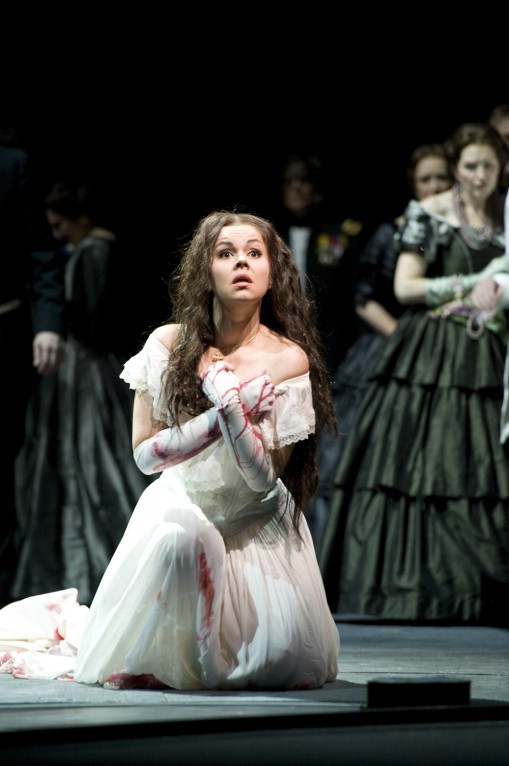In a role debut, Polish soprano proves an electrifying Lucia in Seattle

Aleksandra Kurzak in the title role of Seattle Opera's "Lucia di Lammermoor." Photo: Rozarii Lynch
An impresario as smart as Seattle Opera’s Speight Jenkins does not bother to present Lucia di Lammermoor unless he has a dynamite Lucia. This time, Jenkins took a chance on the Polish soprano Aleksandra Kurzak, whom he chose despite the fact that she would be undertaking the role for the first time. He knew she had the high-flying coloratura, the emotional intensity, and the sheer presence to make a great Lucia.
Kurzak did not disappoint. Operaphiles in the house for her Seattle performances couldn’t believe this was her first Lucia – not with the utter assurance and verve with which she sang and acted. It’s rare to see a singer so totally inhabit this role, while simultaneously making the harrowing vocal demands sound almost easy.
Kurzak’s voice is smooth and creamy throughout the register, with an evenness extending upward to the high E-flats. The notes above the staff were thrillingly and accurately produced, never scrawny or screechy (and often sung while Kurzak was on the floor, on her knees, or in full flight across the stage). This also is a singer who really knows how to establish an almost electric connection with an audience. Operagoers leaned forward in their seats to hear and see what this Lucia would do next. Gasps were heard when Kurzak and her Edgardo, William Burden, rose to an unexpected high E-flat/high C climax to their Act I duet.
It didn’t hurt, either, that Kurzak and Burden are very easy on the eyes. Both relatively young, trim, and believable in their roles, this duo did all but ignite the scenery in breathless love or furious repudiation. Burden, last heard in Seattle as the all-American pilot father in the premiere of Daron Hagen’s opera Amelia, has metamorphosed into the complete Italian, with just the right subtle sob in the voice and those little embellishments beloved of Donizetti interpreters. His sound was just right for Edgardo, as was his impetuous acting.
Much of the production’s success is also due to director Tomer Zvulun, who took the risky decision to stage the overture–here introducing the ghost that later haunts Lucia, and briefly establishing the love relationship of the Lucia and Edgardo. Often, these overture activities just leave the listener wishing the director could allow the music to set the scene as the composer intended. But this time, the staged vignettes worked nicely. Zvulun continued to make the ghost an ongoing presence, not just a figment of Lucia’s feverish imagination. When she sings that the ghost is beckoning to her, the ingenious use of lighting (by Robert Wierzel) and scrims allows the ghost to manifest; we see this specter just as Lucia does.
The set, designed for an earlier Seattle I Puritani by Robert Dahlstrom, adapts particularly well to this show, with its prominent staircase so essential to the Mad Scene, and its arcades that allow the wedding guests plenty of room to circulate without crowding the principals.
Zvulun’s direction is all about action and intensity, never about the sort of static tableaux common to productions of Lucia. Enrico (Ljubomir Puskaric) is a brute and a bully, manhandling his sister Lucia; Raimondo (Arthur Woodley) is all calm commanding strength. Supporting roles (Normanno, Alisa and Arturo) are well taken by Eric Neuville, Lindsey Anderson, and Andrew Stenson, respectively. Chorusmaster Beth Kirchhoff did an excellent job with the chorus, which sang and acted with both vigor and accuracy. They looked great in Deborah Trout’s opulent and suitably dark-hued period costumes.
Conductor Bruno Cinquegrani proved a flexible, pliant accompanist to the singers, letting them breathe and embellish and spend some time on the high notes. In a few scenes, balances were off a bit, with too much orchestral sound for the singers. This is a minor and easily corrected detail, however, possibly attributable to Cinquegrani’s debut status in Seattle’s Marion Oliver McCaw Hall.
Lucia di Lammermoor runs through Oct. 30. seattleopera.org; 206-389-7676, 800-426-1619
Posted Nov 01, 2010 at 3:04 pm by Peter Rice
I attended the final performance of Lucia on Saturday, Oct. 30th. I am not a serious opera fan, but have seen perhaps a dozen in my life, including Lucia previously. The performance eclipsed any live classical performance I have ever seen, from Aleksandra to William Burden to the other leads, to the staging and performance of the chorus and orchestra. Unbelievable, and I suspect unrivalled with any recent performance of Lucia elsewhere. The sold out audience went through the roof. An experience of artistic, creative performance that was transcendent.